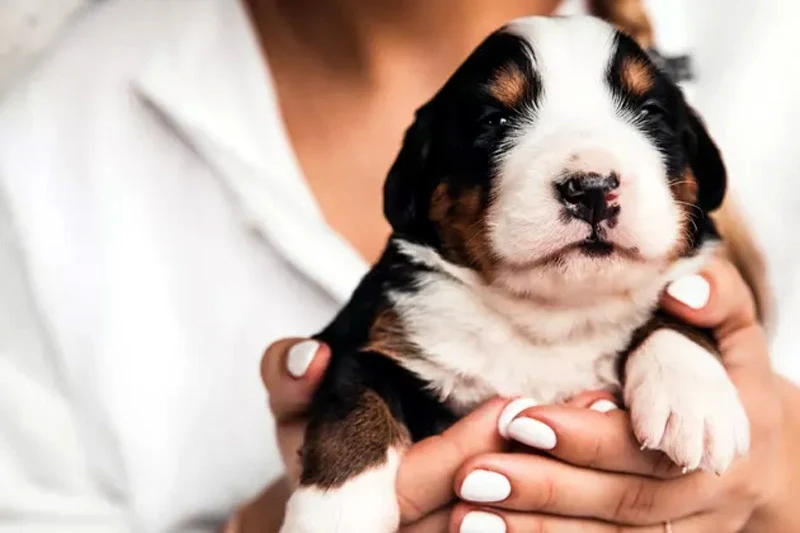![[feature] When Can I Introduce My Puppy to Other Dogs?](https://blogger.googleusercontent.com/img/b/R29vZ2xl/AVvXsEjau_DSNPGefDjbrHUYxXM_QpuzXaQ4dTFfEMYtFW0XmK1cWQK62okSqYW04dX_HQxnFdLg0utGsqNSW89FSQXxTWWE0inNPEEYJkGnlo0IUqgVAXgx4ZMLdqO_j0eHpdiIaPENcLalphK8/s16000-rw/food.dearjulius.com.jpg) |
| © redstallion / iStock / GettyImages |
By Krissy Howard , Cuteness
Like people, dogs are social animals, and being around other dogs and humans is an inherent need that canines have. It's best when dogs are socialized early in life, especially within the first three months, but knowing how to introduce a puppy to new dogs, people, and surroundings should be done with care and concern. Generally, puppies can start meeting other dogs within the first couple months of life, but be sure to have your friend fully vaccinated before taking her on well-attended outings.
Keeping your puppy safe
Puppies are given vaccines on a schedule and over time, and their exposure to certain situations, like outdoor parks or boarding facilities, will depend on their age and vaccinations. The first vaccination usually starts around 6-8 weeks, and often includes shots protecting them from parvovirus, bordetella, or kennel cough, and canine influenza. Puppies who have had these immunizations can attend puppy classes in clean, reputable facilities, and can meet healthy, immunized puppies and dogs, but should stay out of public parks, and limit time on sidewalks.Booster shots given about once a month after that until a puppy is about five months old. The flexibility of introducing puppies to new surroundings does expand with each set of booster shots, but it is still not recommended that you allow any puppy to venture into dog parks or meet dogs of unknown vaccination status until all shots have been received. In the meantime, holding smaller playdates in locations that you know to be safe will protect your puppy, and her playmates, from diseases and possible health complications.
The importance of puppy socialization
Ideally, puppies begin to socialize immediately after birth, with their littermates and their mothers to bond with and learn from. At around three weeks of age, puppies can start to become familiar with people who are consistent in their lives. It is recommended that puppies are especially given the opportunity to socialize in their first three months of life, which will have a great impact on their development and social maturity later in life. Socialization usually starts at home, where puppies learn trust, communication, boundaries and basic commands from the people around (and sometimes, older animals in the home.) Gradually, puppies should be exposed to a variety of people, animals, sounds and situations as weeks and months progress, which will help them familiarize themselves with things they may encounter on walks or outings.Like training, socialization should be fun, and when your puppy is enjoying herself during the learning process, she is more likely to build positive associations with what she's being exposed to. Rewarding your puppy with praise and treats is a great way to make socializing fun, and taking mental, emotional, and physical safety measures early on is essential in successful socialization.
Common concerns to keep in mind
When you do introduce your puppy to a new dog, doing so on neutral territory, like a friend's fenced yard, is best when possible. Allow both dogs to sniff out the space, and each other, and do your best to keep calm, resisting the urge to hover. Keeping your dog's leashes as loose as possible will help reduce feelings of constriction, which can lead to anxiety. Dogs will communicate with each other via body language, which can sometimes look aggressive or too rough, but may simply be a matter of setting boundaries and establishing their relationship. Regardless, always be sure to supervise socialization and remove your dog from the situation if he seems to be overwhelmed or stressed by the encounter.It may sound outrageous to many, but the truth is, some people and animals just don't like puppies. This isn't stated to knock your puppy down a peg! It's just an important tool in ensuring positive encounters with new faces your puppy meets. Socialization is a great opportunity for a young dog to become acclimated with the world around, but meeting dogs or people who may be aggressive toward them, or guarantee a negative experience with them, can be counterproductive. This can be especially true with some adult dogs and young children, who may be irritated or overwhelmed by a very young dog.
 |
| © Serbogachuk / iStock / Getty Images |
Of course, there is no way to guarantee that everything will go smoothly 100% of the time, but in those first few months of a dog's life, it's best to seek out positive experiences as much as possible, and stick to people and animals you know to be tolerant and patient.
In conclusion
Socialization is an important part of any dog's life, at any age. Before socializing your new puppy in public spaces or with dogs you don't know, make sure he is fully vaccinated, which should be between five and six months of age. If your vet recommends a different age for any reason, defer to them. It's best to expose your dog to a variety of people, places, things and animals, but always take caution before introducing, and don't put your puppy in danger.See more at Cuteness
























